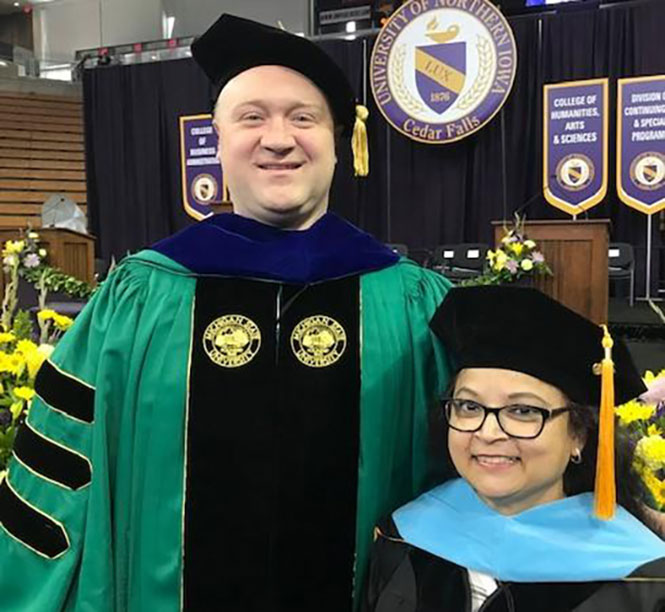Mahjabeen Hussain

Mahjabeen Hussain
Mahjabeen Hussain loved English literature and languages growing up as a Bangladesh native. Bengali is her native language, but she learned Urdu, French, and Arabic along with English, having lived abroad during her formative years.
Her exposure to learning these languages as a foreign language would lay a foundation for her future.
Mahjabeen’s initial degrees were in English literature (B.A.) and English (M.A.) from Dhaka University in Bangladesh. However, the awarding of the Hornby Scholarship for post-graduate studies at University of Leeds in England led to a change of focus: teaching English to speakers of other languages (TESOL). A friend (and husband-to-be) encouraged her, thought she would do well, and recognized the demand for English language teaching. Mahjabeen found her niche. She accepted a teaching position at North South University, a leading private university in Bangladesh.
“I ended up at the same university for 19 years; that’s when I discovered this is what I want to do,” she says. “I didn’t look back, I didn’t think of any other profession; I discovered that I had the passion the very first year.”
Mahjabeen always planned to seek her doctoral degree; it was just a matter of when. Family commitments took priority. But finally ready to proceed, she had her family's support and chose University of Northern Iowa where a brother also taught.
A learner-centered approach to education
When she reached her dissertation, her chose to focus on “Understanding ESL undergraduate students’ beliefs about learner-centered instruction,” as an opportunity to bring greater understanding to the classroom.
“While I was teaching, I saw that there needs to be a connection between research and actual classroom teaching practices, and that seemed to be missing in my context (of TESOL),” she says. “I wanted to do my doctoral studies for my own professional growth, and I knew I could help learners as well as educators in my country.”
A learner-centered (LC) approach is different than an instructor-led experience; the learner or student is expected to take responsibility for their learning and to look for opportunity to learn both in and out of the classroom. With this perspective, LC learning goes beyond getting a degree and has academic and non-academic learning outcomes.
Mahjabeen says often ESL or English as a foreign language (EFL) students’ learning experiences are teacher-centered. Therefore, familiar with learner-centered (LC) education as both student and instructor, she had personal and professional interest in understanding this approach to instruction through the eyes of ESL students.
As a professor, she had witnessed the struggles some of her students in ESL classes had as they adjusted to the more westernized LC approach. “I knew if I ever do doctoral studies, I would focus on my learners. I also had the teachers in mind; I saw colleagues struggling who had different academic backgrounds.”
The dissertation
Her final work was in-depth; more than 365 pages long, representing both survey and focus group research. As her dissertation came together, what stood out to Mahjabeen was the shared recognition by many of the ESL students that learning does not culminate with achieving a degree. They perceived LC learning as facilitating acculturation, building interpersonal relationships and promoting lifelong learning.
“If it’s only the teachers who are just providing the instruction, we never hear the voices of the learners. So these ESL learners, they have had very different experiences,” she says. “In each focus group, this idea emerged. They realized learning never ends; they had accepted this and were adapting to this new mode of learning.”
How do her findings translate to the classroom? “If I were the instructor, I would encourage students to take responsibility for their own learning. Instead of giving them instruction, I would facilitate their learning by providing them a variety of activities, and would not limit their learning to the classroom,” she says.
The confidence to achieve
“Through the Ed.D. program, I have had the opportunity to learn to define educational practices in my context, enhance skills related to problem identification, data collection, analysis and interpretation,” she says. “I got help from so many people. My doctoral committee was just wonderful! When we had meetings, it was so vibrant!”
Mahjabeen placed first in her oral presentation of her dissertation at the 2019 Graduate Student Symposium, just one of many honors and scholarships she’s received. She looks ahead with a sense of accomplishment, and hopes to encourage other educators to adopt evidence-based practices in her field -- whether in Iowa or, eventually, back in Bangladesh.
“My dissertation was the culmination of nearly two decades of passion for teaching and thirst for research. I feel so humbled by the experience.”
